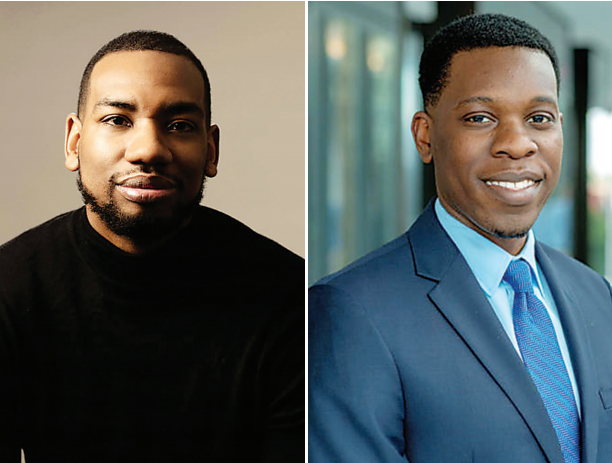
Robert Samuels and Toluse Olorunnipa, co-authors of “His Name is George Floyd: One Man’s Life and The Struggle for Racial Justice.”

BOOK REVIEW
“His Name Is George Floyd: One Man’s Life and The Struggle for Racial Justice’’ by Robert Samuel and Toluse Olorunnipa. Viking. 432 pages. $30.
At age 13, George Floyd Jr. told his little sister: “I don’t want to rule the world. I don’t want to run the world. I just want to touch the world.”
Eleven years later, after his dream of becoming a professional football player had been dashed, Floyd was arrested for allegedly selling crack cocaine to an undercover officer for $18, pled no contest, and agreed to serve a sixmonth sentence.
Along with hundreds of dollars in court debt, Washington Post reporters Robert Samuel and Toluse Olorunnipa tell us, Floyd left jail with mental and psychological wounds, including anxiety and claustrophobia, a criminal record, no college degree and few job prospects.
After hanging out for a time with aspiring musicians in a collective called “Screwed Up Click,” Floyd recorded a song expressing his mood: “I’ve been broke for so long/ I’ve been stuck in last place for so long/ Loaded (loaded) with potential but I’m still going wrong/ Need to get my act together quick, nigga, and start being grown.”
His rap was never released. For the rest of his life, in Houston, Texas and Minneapolis, Minnesota, “Big Floyd” struggled to get his act together.
In “His Name Is George Floyd,” Samuel and Olorunnipa tell the story of Floyd’s life and document the obstacles he faced because of the color of his skin. Their powerful and poignant book reminds us that in the United States Black lives do not matter nearly as much as they should.
Stacked deck
The authors acknowledge that Floyd had trouble holding a job, paying his bills, resisting the temptations of drug addiction and drug dealing, and staying out of jail. But they emphasize that as he battled his inner demons and received encouragement and assistance from his large extended family and many friends, the deck was stacked against him.
The nation’s tough on crime policies, they write, “swept up an entire generation of Black males in a seemingly never-ending cycle of incarceration and deepening poverty,” returning to their old neighborhoods “with police officers circling the block, looking for someone to arrest.”
In Houston, Floyd was stopped by cops at least 12 times. One encounter, which began because “he did not look like he was going anywhere in particular,” led to a fail-to-identify conviction and 30 days in jail. On eight occasions, Floyd, who could not afford to hire a private lawyer, and realized his chances of prevailing in a trial were remote, agreed to plead guilty.
Texas law barred convicted felons from receiving food stamps, and from working in state government or in positions that required trade licenses in state government. Texas made it easy for landlords and public housing authorities to discriminate against potential tenants.
In Minneapolis, a prosperous city where Floyd hoped to redeem himself, one in every four Black households lived in poverty, five times the rate for whites. The gap between the races among students in reading comprehension is greater in Minnesota, which brags about its excellent system of public education, than in most other states.
Samuel and Olorunnipa provide an informative and gripping account of the day George Floyd died and the murder trial of Derek Chauvin.
In his closing remarks to the jury, we learn, prosecuting attorney Steve Schleicher declared, “We were told, for example, that Mr. Floyd died because his heart was too big…having heard all the evidence, you know the truth… the reason George Floyd is dead is because Mr. Chauvin’s heart was too small.”
Short-term justice
The authors’ analysis of the huge protest movement that invoked Floyd’s name also reveals the difficulties of defining what “Justice for George Floyd” actually means, let alone achieving it.
When the city council announced Minneapolis would pay $27 million to Floyd’s estate, they write, his siblings were pleased because it meant their brother’s life had meant something but felt empty because “money could not wipe away centuries of Black families being cheated, ignored and tortured” by institutions that were supposed to serve their citizens.
They wanted justice in the courts, in government, in society at large. But someone close to Big Floyd said, “I know the reality of things… It takes so long to make huge, systematic changes.”
A year after George Floyd’s murder, Samuel and Olorunnipa report, his brother wondered whether the nation’s soul-searching over racism retained enough momentum to make lasting change.
Even more ominously, as he witnessed democracy under threat and communities in Minnesota losing faith, Governor Tim Walz, and many other Americans, worried that “We may not get another shot at this.”
Dr. Glenn C. Altschuler is the Thomas and Dorothy Litwin Professor of American Studies at Cornell University. He wrote this review for the Florida Courier.





(0) comments
Welcome to the discussion.
Log In
Keep it Clean. Please avoid obscene, vulgar, lewd, racist or sexually-oriented language.
PLEASE TURN OFF YOUR CAPS LOCK.
Don't Threaten. Threats of harming another person will not be tolerated.
Be Truthful. Don't knowingly lie about anyone or anything.
Be Nice. No racism, sexism or any sort of -ism that is degrading to another person.
Be Proactive. Use the 'Report' link on each comment to let us know of abusive posts.
Share with Us. We'd love to hear eyewitness accounts, the history behind an article.